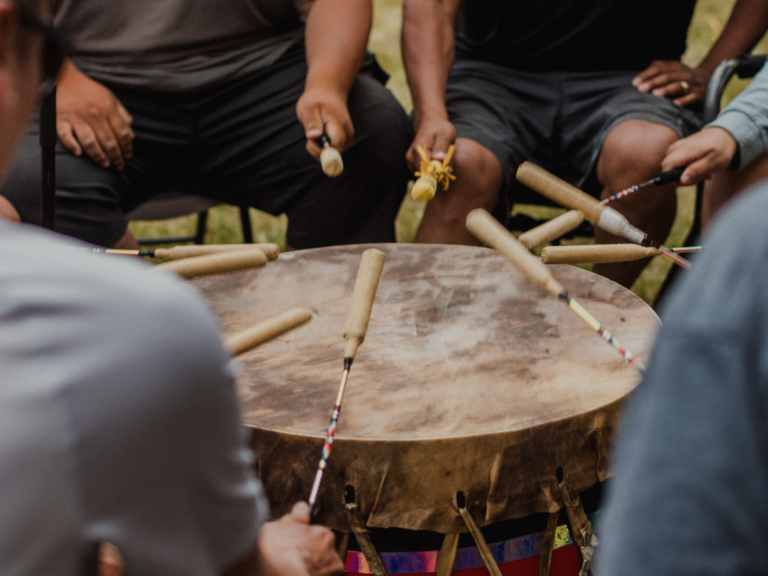
Industry and government play an important role in economic reconciliation by ensuring balanced procurement policies, authentic community engagement, and relationship-building that values and respects Indigenous worldviews and listens to all voices.
Truth & Reconciliation
Addressing the Impact of Colonialism
More than 150,000 Indigenous children were removed from their families and communities and forced to attend one of 139 residential schools across Canada. These schools were often underfunded, overcrowded, and provided substandard education. Children were punished for speaking their own language, and many also experienced sexual and mental abuse. The shameful legacy of this system, one of many wrongs perpetrated against Indigenous people, continues to impact communities and families today.
From 2007 to 2015, the Truth & Reconciliation Commission (TRC) heard from more than 6,500 witnesses and survivors of Indian Residential Schools, striving to create an accurate historical record of the residential schools system, educate all people in Canada about its history and legacy, and share and honour the experiences of survivors and their families. The final TRC report includes 94 “Calls to Action,” recommendations to advance reconciliation in a range of areas, including child welfare, language and culture, education, health, justice, and business.
“For over a century, the central goals of Canada’s Aboriginal policy were to eliminate Aboriginal governments; ignore Aboriginal rights; terminate the Treaties; and, through a process of assimilation, cause Aboriginal peoples to cease to exist as distinct legal, social, cultural, religious, and racial entities in Canada. The establishment and operation of residential schools were a central element of this policy, which can best be described as ‘cultural genocide.’”
“Honouring the Truth, Reconciling for the Future,” TRC Final Report, 2015
Business & Reconciliation
TRC Call to Action #92: We call upon the corporate sector in Canada to adopt the United Nations Declaration on the Rights of Indigenous Peoples as a reconciliation framework and to apply its principles, norms, and standards to corporate policy and core operational activities involving Indigenous peoples and their lands and resources. This would include, but not be limited to, the following:
-
- Commit to meaningful consultation, building respectful relationships, and obtaining the free, prior, and informed consent of Indigenous peoples before proceeding with economic development projects.
- Ensure that Aboriginal peoples have equitable access to jobs, training, and education opportunities in the corporate sector, and that Aboriginal communities gain long-term sustainable benefits from economic development projects.
- Provide education for management and staff on the history of Aboriginal peoples, including the history and legacy of residential schools, the United Nations Declaration on the Rights of Indigenous Peoples, Treaties and Aboriginal rights, Indigenous law, and Aboriginal–Crown relations. This will require skills based training in intercultural competency, conflict resolution, human rights, and anti-racism.
By increasing access to education, training and job opportunities, and including Indigenous history, culture, and anti-racism training in employee professional development plans, businesses play an important role in the journey of reconciliation. Inclusive procurement policies support the growth of Indigenous businesses and communities and lead to a more inclusive economy that benefits all Canadians.
Housing & Reconciliation
Despite global recognition as a human right (United Declaration on the RIghts of Indigenous Peoples, 2007), Indigenous people do not have equitable access to adequate housing. Chronic underfunding and jurisdictional disputes mean the majority of Indigenous communities in Canada struggle with overcrowding, substandard construction and maintenance, and inadequate infrastructure (i.e., sewer, electrical, heating, and water systems).
Safe, quality housing is a proven determinant of social and economic wellbeing. At FNIA, we believe healthy homes and community spaces enable culture, family, education and communities to thrive and are committed to doing our part to improve housing conditions for Indigenous peoples, including advocating for on-reserve code and compliance standards that meet those in communities that fall under federal and provincial regulation.
FNIA inspectors have a deep understanding of and respect for Indigenous worldviews, governance, and culture. We have extensive experience working with Indigenous and non-Indigenous organizations and governments across Canada, and are always open to building relationships with people and businesses that want to learn and collaborate to create positive change.
FNIA is doing its part to make change with programs and services dedicated to increasing the quality and safety of homes and buildings on First Nations.
First Nations Inspection Programs
FNIA works with community leaders to develop inspection plans and compliance oversight for all on-reserve buildings, including new developments, existing homes, and community structures. FNIA inspectors also serve as technical advisers on new builds and on renovations of existing structures to meet code requirements. Our inspectors identify housing deficiencies that can be relayed for support-funding and can represent First Nations when liaising with Indigenous Services Canada and CMHC.